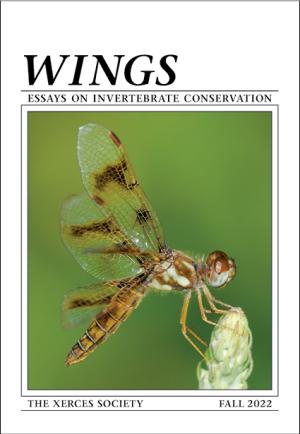
Understanding the natural history of the species we work with is the foundation of our efforts to protect invertebrates and their habitats. We at Xerces are completely enthralled by the amazing behaviors, intriguing relationships, and eye-catching beauty of these animals. This issue of Wings features bees, butterflies and wasps, and dragonflies. We hope you find them as entrancing as we do.
Turning over Rocks Can Lead to Life-Defining Discoveries, by Scott Black. Page 3.
The Secret Life of Forest Bees, by Kass Urban-Mead. We may think of bees as creatures of sunny open places, but in forested regions, they are adapted to exploit the many resources that trees offer. Page 5.
Careful Observation Unlocks Hidden Connections Between Species, by Kevin Burls. The interactions between plants and insects or between insects and insects are complex. Time spent closely watching plants and insects can uncover fascinating and sometimes unexpected relationships. Page 12.
Ambassadors for a Watery World, by Michele Blackburn. Despite being a familiar sight around ponds and creeks, much remains to be understood about dragonflies, particularly details about their life histories and their conservation status. Page 18.
Staff Profile. Logan Lauvray, accounting and data manager. Page 25.
Partner Spotlight. LandPaths approaches its work with a deep commitment to equity in the outdoors. Page 26.
Xerces News. Updates on Xerces Society projects and successes. Page 27.
